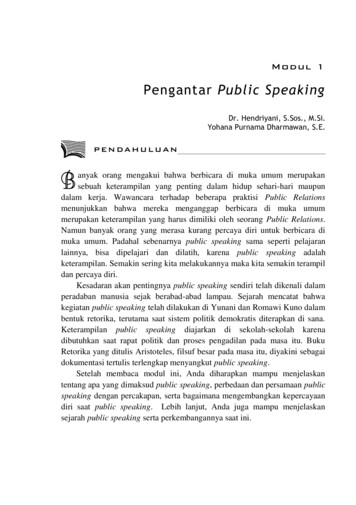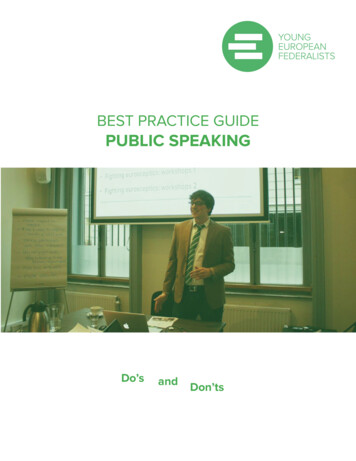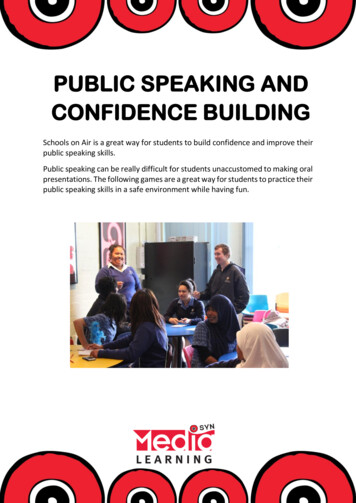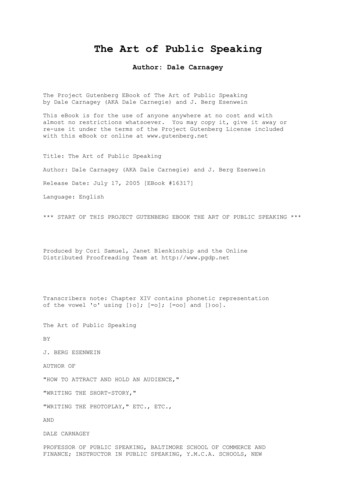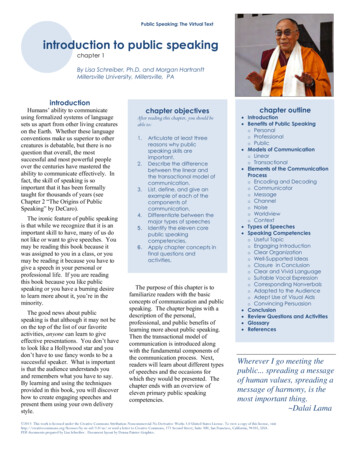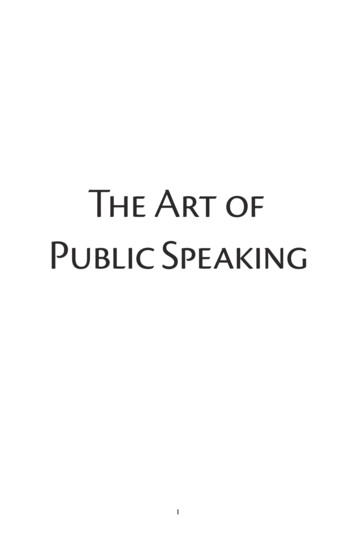
Transcription
The Art ofPublic Speakingi
WritingsThe Art of Public Speakingii
The Art of PublicSpeakingAn Inspirational Working Handbook of Instruction for All WhoWould Become Efficient Public Speakers1915J. Berg EsenweinDale Carnagey1888–1955信YOGeBooks: Springfield, MO2010:10:19:11:32:33iii
The Art of Public SpeakingCopyrightYogeBooks by Roger L. Cole, Springfield, MO 65810 2010 YogeBooks by Roger L. ColeAll rights reserved. Electronic edition published 2010ISBN: XXX‑X‑XXX‑XXXXX‑X (pdf)iv
DedicationDedicationToF. Arthur MetcalfFellow‑Worker and Friendv
The Art of Public SpeakingEpigraphSense never fails to give them that have it, Words enoughto make them understood. It too often happens in someconversations, as in Apothecary Shops, that those Pots that areEmpty, or have Things of small Value in them, are as gaudilyDress’d as those that are full of precious Drugs.They that soar too high, often fall hard, making a low andlevel Dwelling preferable. The tallest Trees are most in the Powerof the Winds, and Ambitious Men of the Blasts of Fortune.Buildings have need of a good Foundation, that lie so muchexposed to the Weather. —William Penn.vi
ContentsContents1 Chapter One2 Chapter Twovii
The Art of Public Speakingviii
A ForewordA ForewordThings to Think of Firsthe efficiency of a book is like that of a man, in oneimportant respect: its attitude toward its subject is thefirst source of its power. A book may be full of good ideaswell expressed, but if its writer views his subject from the wrongangle even his excellent advice may prove to be ineffective.This book stands or falls by its authors’ attitude toward itssubject. If the best way to teach oneself or others to speakeffectively in public is to fill the mind with rules, and to set upfixed standards for the interpretation of thought, the utteranceof language, the making of gestures, and all the rest, then thisbook will be limited in value to such stray ideas throughoutits pages as may prove helpful to the reader—as an effort toenforce a group of principles it must be reckoned a failure,because it is then untrue.It is of some importance, therefore, to those who take upthis volume with open mind that they should see clearly atthe out‑start what is the thought that at once underlies and isbuilded through this structure. In plain words it is this:Training in public speaking is not a matter of externals—primarily; it is not a matter of imitation—fundamentally; it is notixT
The Art of Public Speakinga matter of conformity to standards—at all. Public speaking ispublic utterance, public issuance, of the man himself; thereforethe first thing both in time and in importance is that the manshould be and think and feel things that are worthy of beinggiven forth. Unless there be something of value within, no tricksof training can ever make of the talker anything more than amachine—albeit a highly perfected machine—for the deliveryof other men’s goods. So self‑development is fundamental inour plan.The second principle lies close to the first: The man mustenthrone his will to rule over his thought, his feelings, and allhis physical powers, so that the outer self may give perfect,unhampered expression to the inner. It is futile, we assert, tolay down systems of rules for voice culture, intonation, gesture,and what not, unless these two principles of having somethingto say and making the will sovereign have at least begun tomake themselves felt in the life.The third principle will, we surmise, arouse no dispute: Noone can learn how to speak who does not first speak as best hecan. That may seem like a vicious circle in statement, but it willbear examination.Many teachers have begun with the how. Vain effort! It is anancient truism that we learn to do by doing. The first thing forthe beginner in public speaking is to speak—not to study voiceand gesture and the rest. Once he has spoken he can improvehimself by self‑observation or according to the criticisms ofthose who hear.But how shall he be able to criticise himself? Simply by findingout three things: What are the qualities which by commonconsent go to make up an effective speaker; by what means atleast some of these qualities may be acquired; and what wronghabits of speech in himself work against his acquiring and usingthe qualities which he finds to be good.Experience, then, is not only the best teacher, but the first andthe last. But experience must be a dual thing—the experiencex
A Forewordof others must be used to supplement, correct and justify ourown experience; in this way we shall become our own bestcritics only after we have trained ourselves in self‑knowledge,the knowledge of what other minds think, and in the ability tojudge ourselves by the standards we have come to believe areright. “If I ought,” said Kant, “I can.”An examination of the contents of this volume will showhow consistently these articles of faith have been declared,expounded, and illustrated. The student is urged to beginto speak at once of what he knows. Then he is given simplesuggestions for self‑control, with gradually increasing emphasisupon the power of the inner man over the outer. Next, the wayto the rich storehouses of material is pointed out. And finally,all the while he is urged to speak, speak, SPEAK as he is applyingto his own methods, in his own personal way, the principles hehas gathered from his own experience and observation and therecorded experiences of others.So now at the very first let it be as clear as light that methodsare secondary matters; that the full mind, the warm heart,the dominant will are primary—and not only primary butparamount; for unless it be a full being that uses the methodsit will be like dressing a wooden image in the clothes of a man. J. Berg Esenwein.Narberth, Pa.,January 1, 1915.xi
The Art of Public Speakingxii
The Art of PublicSpeaking1
The Art of Public Speaking2
Chapter I.Acquiring Confidence BeforeAn AudienceThere is a strange sensation often experienced in the presence of an audience.It may proceed from the gaze of the many eyes that turn upon the speaker,especially if he permits himself to steadily return that gaze. Most speakershave been conscious of this in a nameless thrill, a real something, pervadingthe atmosphere, tangible, evanescent, indescribable. All writers have bornetestimony to the power of a speaker’s eye in impressing an audience. Thisinfluence which we are now considering is the reverse of that picture—the power their eyes may exert upon him, especially before he begins tospeak: after the inward fires of oratory are fanned into flame the eyes of theaudience lose all terror.—William Pittenger, Extempore Speech.Students of public speaking continually ask, “How can Iovercome self‑consciousness and the fear that paralyzesme before an audience?”Did you ever notice in looking from a train window thatsome horses feed near the track and never even pause to lookup at the thundering cars, while just ahead at the next railroadcrossing a farmer’s wife will be nervously trying to quiet herscared horse as the train goes by?3
The Art of Public SpeakingHow would you cure a horse that is afraid of cars—graze himin a back‑woods lot where he would never see steam‑engines orautomobiles, or drive or pasture him where he would frequentlysee the machines?Apply horse‑sense to ridding yourself of self‑consciousnessand fear: face an audience as frequently as you can, and youwill soon stop shying. You can never attain freedom fromstage‑fright by reading a treatise. A book may give you excellentsuggestions on how best to conduct yourself in the water, butsooner or later you must get wet, perhaps even strangle and be“half scared to death.” There are a great many “wetless” bathingsuits worn at the seashore, but no one ever learns to swim inthem. To plunge is the only way.Practise, practise, PRACTISE in speaking before an audiencewill tend to remove all fear of audiences, just as practise inswimming will lead to confidence and facility in the water. Youmust learn to speak by speaking.The Apostle Paul tells us that every man must work out hisown salvation. All we can do here is to offer you suggestions asto how best to prepare for your plunge. The real plunge no onecan take for you. A doctor may prescribe, but you must takethe medicine.Do not be disheartened if at first you suffer fromstage‑fright. Dan Patch was more susceptible to suffering thana superannuated dray horse would be. It never hurts a fool toappear before an audience, for his capacity is not a capacity forfeeling. A blow that would kill a civilized man soon heals on asavage. The higher we go in the scale of life, the greater is thecapacity for suffering.For one reason or another, some master‑speakers neverentirely overcome stage‑fright, but it will pay you to spareno pains to conquer it. Daniel Webster failed in his firstappearance and had to take his seat without finishing hisspeech because he was nervous. Gladstone was often troubled4
Acquiring Confidence Before An Audiencewith self‑consciousness in the beginning of an address. Beecherwas always perturbed before talking in public.Blacksmiths sometimes twist a rope tight around the noseof a horse, and by thus inflicting a little pain they distract hisattention from the shoeing process. One way to get air out of aglass is to pour in water.Be Absorbed by Your SubjectApply the blacksmith’s homely principle when you arespeaking. If you feel deeply about your subject you will be ableto think of little else. Concentration is a process of distractionfrom less important matters. It is too late to think about the cutof your coat when once you are upon the platform, so centreyour interest on what you are about to say—fill your mind withyour speech‑material and, like the infilling water in the glass, itwill drive out your unsubstantial fears.Self‑consciousness is undue consciousness of self, and, forthe purpose of delivery, self is secondary to your subject, notonly in the opinion of the audience, but, if you are wise, in yourown. To hold any other view is to regard yourself as an exhibitinstead of as a messenger with a message worth delivering. Doyou remember Elbert Hubbard’s tremendous little tract, “AMessage to Garcia”? The youth subordinated himself to themessage he bore. So must you, by all the determination you canmuster. It is sheer egotism to fill your mind with thoughts ofself when a greater thing is there—TRUTH. Say this to yourselfsternly, and shame your self‑consciousness into quiescence. Ifthe theater caught fire you could rush to the stage and shoutdirections to the audience without any self‑consciousness,for the importance of what you were saying would drive allfear‑thoughts out of your mind.Far worse than self‑consciousness through fear of doingpoorly is self‑consciousness through assumption of doing well.The first sign of greatness is when a man does not attempt tolook and act great. Before you can call yourself a man at all,5
The Art of Public SpeakingKipling assures us, you must “not look too good nor talk toowise.”Nothing advertises itself so thoroughly as conceit. One maybe so full of self as to be empty. Voltaire said, “We must concealself‑love.” But that can not be done. You know this to be true,for you have recognized overweening self‑love in others. If youhave it, others are seeing it in you. There are things in this worldbigger than self, and in working for them self will be forgotten,or—what is better—remembered only so as to help us wintoward higher things.Have Something to SayThe trouble with many speakers is that they go before anaudience with their minds a blank. It is no wonder that nature,abhorring a vacuum, fills them with the nearest thing handy,which generally happens to be, “I wonder if I am doing thisright! How does my hair look? I know I shall fail.” Their propheticsouls are sure to be right.It is not enough to be absorbed by your subject—toacquire self‑confidence you must have something in whichto be confident. If you go before an audience without anypreparation, or previous knowledge of your subject, you oughtto be self‑conscious—you ought to be ashamed to steal thetime of your audience. Prepare yourself. Know what you aregoing to talk about, and, in general, how you are going to sayit. Have the first few sentences worked out completely so thatyou may not be troubled in the beginning to find words. Knowyour subject better than your hearers know it, and you havenothing to fear.After Preparing for Success, Expect ItLet your bearing be modestly confident, but most of allbe modestly confident within. Over‑confidence is bad, butto tolerate premonitions of failure is worse, for a bold man6
Acquiring Confidence Before An Audiencemay win attention by his very bearing, while a rabbit‑heartedcoward invites disaster.Humility is not the personal discount that we must offer inthe presence of others—against this old interpretation therehas been a most healthy modern reaction. True humility anyman who thoroughly knows himself must feel; but it is nota humility that assumes a worm‑like meekness; it is rather astrong, vibrant prayer for greater power for service—a prayerthat Uriah Heep could never have uttered.Washington Irving once introduced Charles Dickens at adinner given in the latter’s honor. In the middle of his speechIrving hesitated, became embarrassed, and sat down awkwardly.Turning to a friend beside him he remarked, “There, I told you Iwould fail, and I did.”If you believe you will fail, there is no hope for you. You will.Rid yourself of this I‑am‑a‑poor‑worm‑in‑the‑dust idea. Youare a god, with infinite capabilities. “All things are ready if themind be so.” The eagle looks the cloudless sun in the face.Assume Mastery Over Your AudienceIn public speech, as in electricity, there is a positive and anegative force. Either you or your audience are going to possessthe positive factor. If you assume it you can almost invariablymake it yours. If you assume the negative you are sure to benegative. Assuming a virtue or a vice vitalizes it. Summon allyour power of self‑direction, and remember that though youraudience is infinitely more important than you, the truth ismore important than both of you, because it is eternal. If yourmind falters in its leadership the sword will drop from yourhands. Your assumption of being able to instruct or lead orinspire a multitude or even a small group of people may appallyou as being colossal impudence—as indeed it may be; buthaving once essayed to speak, be courageous. BE courageous—it lies within you to be what you will. MAKE yourself be calmand confident.7
The Art of Public SpeakingReflect that your audience will not hurt you. If Beecher inLiverpool had spoken behind a wire screen he would haveinvited the audience to throw the over‑ripe missiles with whichthey were loaded; but he was a man, confronted his hostilehearers fearlessly—and won them.In facing your audience, pause a moment and look themover—a hundred chances to one they want you to succeed, forwhat man is so foolish as to spend his time, perhaps his money,in the hope that you will waste his investment by talking dully?Concluding HintsDo not make haste to begin—haste shows lack of control.Do not apologize. It ought not to be necessary; and if it is, itwill not help. Go straight ahead.Take a deep breath, relax, and begin in a quiet conversationaltone as though you were speaking to one large friend. You willnot find it half so bad as you imagined; really, it is like taking acold plunge: after you are in, the water is fine. In fact, havingspoken a few times you will even anticipate the plunge withexhilaration. To stand before an audience and make them thinkyour thoughts after you is one of the greatest pleasures youcan ever know. Instead of fearing it, you ought to be as anxiousas the fox hounds straining at their leashes, or the race horsestugging at their reins.So cast out fear, for fear is cowardly—when it is not mastered.The bravest know fear, but they do not yield to it. Face youraudience pluckily—if your knees quake, MAKE them stop. Inyour audience lies some victory for you and the cause yourepresent. Go win it. Suppose Charles Martell had been afraidto hammer the Saracen at Tours; suppose Columbus had fearedto venture out into the unknown West; suppose our forefathershad been too timid to oppose the tyranny of George the Third;suppose that any man who ever did anything worth while hadbeen a coward! The world owes its progress to the men whohave dared, and you must dare to speak the effective word that8
Acquiring Confidence Before An Audienceis in your heart to speak—for often it requires courage to utter asingle sentence. But remember that men erect no monumentsand weave no laurels for those who fear to do what they can.Is all this unsympathetic, do you say?Man, what you need is not sympathy, but a push. No onedoubts that temperament and nerves and illness and evenpraiseworthy modesty may, singly or combined, cause thespeaker’s cheek to blanch before an audience, but neither canany one doubt that coddling will magnify this weakness. Thevictory lies in a fearless frame of mind. Prof. Walter Dill Scottsays: “Success or failure in business is caused more by mentalattitude even than by mental capacity.” Banish the fear‑attitude;acquire the confident attitude. And remember that the onlyway to acquire it is—to acquire it.In this foundation chapter we have tried to strike the tone ofmuch that is to follow. Many of these ideas will be amplified andenforced in a more specific way; but through all these chapterson an art which Mr. Gladstone believed to be more powerfulthan the public press, the note of justifiable self‑confidence mustsound again and again.Questions And Exercises.1. What is the cause of self‑consciousness?2. Why are animals free from it?3. What is your observation regarding self‑consciousness inchildren?4. Why are you free from it under the stress of unusualexcitement?5. How does moderate excitement affect you?6. What are the two fundamental requisites for the acquiringof self‑confidence? Which is the more important?7. What effect does confidence on the part of the speakerhave on the audience?9
The Art of Public Speaking8. Write out a two‑minute speech on “Confidence andCowardice.”9. What effect do habits of thought have on confidence?In this connection read the chapter on “Right Thinking andPersonality.”10. Write out very briefly any experience you may have hadinvolving the teachings of this chapter.11. Give a three‑minute talk on “Stage‑Fright,” including a(kindly) imitation of two or more victims.10
Chapter IIThe Sin of MonotonyOne day Ennui was born from Uniformity.—Motte.Our English has changed with the years so that manywords now connote more than they did originally. Thisis true of the word monotonous. From “having but onetone,” it has come to mean more broadly, “lack of variation.”The monotonous speaker not only drones along in the samevolume and pitch of tone but uses always the same emphasis,the same speed, the same thoughts—or dispenses with thoughtaltogether.Monotony, the cardinal and most common sin of the publicspeaker, is not a transgression—it is rather a sin of omission, forit consists in living up to the confession of the Prayer Book: “Wehave left undone those things we ought to have done.”Emerson says, “The virtue of art lies in detachment, insequestering one object from the embarrassing variety.” Thatis just what the monotonous speaker fails to do—he doesnot detach one thought or phrase from another, they are allexpressed in the same manner.To tell you that your speech is monotonous may mean verylittle to you, so let us look at the nature—and the curse—of11
The Art of Public Speakingmonotony in other spheres of life, then we shall appreciatemore fully how it will blight an otherwise good speech.If the Victrola in the adjoining apartment grinds out justthree selections over and over again, it is pretty safe to assumethat your neighbor has no other records. If a speaker uses onlya few of his powers, it points very plainly to the fact that therest of his powers are not developed. Monotony reveals ourlimitations.In its effect on its victim, monotony is actually deadly—itwill drive the bloom from the cheek and the lustre from theeye as quickly as sin, and often leads to viciousness. The worstpunishment that human ingenuity has ever been able to inventis extreme monotony—solitary confinement. Lay a marble onthe table and do nothing eighteen hours of the day but changethat marble from one point to another and back again, and youwill go insane if you continue long enough.So this thing that shortens life, and is used as the most cruelof punishments in our prisons, is the thing that will destroy allthe life and force of a speech. Avoid it as you would shun adeadly dull bore. The “idle rich” can have half‑a‑dozen homes,command all the varieties of foods gathered from the fourcorners of the earth, and sail for Africa or Alaska at their pleasure;but the poverty‑stricken man must walk or take a street car—he does not have the choice of yacht, auto, or special train. Hemust spend the most of his life in labor and be content withthe staples of the food‑market. Monotony is poverty, whetherin speech or in life. Strive to increase the variety of your speechas the business man labors to augment his wealth.Bird‑songs, forest glens, and mountains are not monotonous—it is the long rows of brown‑stone fronts and the miles of pavedstreets that are so terribly same. Nature in her wealth gives usendless variety; man with his limitations is often monotonous.Get back to nature in your methods of speech‑making.The power of variety lies in its pleasure‑giving quality.The great truths of the world have often been couched in12
The Sin of Monotonyfascinating stories—”Les Miserables,” for instance. If you wishto teach or influence men, you must please them, first or last.Strike the same note on the piano over and over again. This willgive you some idea of the displeasing, jarring effect monotonyhas on the ear. The dictionary defines “monotonous” as beingsynonymous with “wearisome.” That is putting it mildly. It ismaddening. The department‑store prince does not disgust thepublic by playing only the one tune, “Come Buy My Wares!”He gives recitals on a 125,000 organ, and the pleased peoplenaturally slip into a buying mood.How to Conquer MonotonyWe obviate monotony in dress by replenishing our wardrobes.We avoid monotony in speech by multiplying our powers ofspeech. We multiply our powers of speech by increasing ourtools.The carpenter has special implements with which toconstruct the several parts of a building. The organist hascertain keys and stops which he manipulates to produce hisharmonies and effects. In like manner the speaker has certaininstruments and tools at his command by which he builds hisargument, plays on the feelings, and guides the beliefs of hisaudience. To give you a conception of these instruments, andpractical help in learning to use them, are the purposes of theimmediately following chapters.Why did not the Children of Israel whirl through the desertin limousines, and why did not Noah have moving‑pictureentertainments and talking machines on the Ark? The laws thatenable us to operate an automobile, produce moving‑pictures,or music on the Victrola, would have worked just as well thenas they do today. It was ignorance of law that for ages deprivedhumanity of our modern conveniences. Many speakers stilluse ox‑cart methods in their speech instead of employingautomobile or overland‑express methods. They are ignorantof laws that make for efficiency in speaking. Just to the extent13
The Art of Public Speakingthat you regard and use the laws that we are about to examineand learn how to use will you have efficiency and force in yourspeaking; and just to the extent that you disregard them willyour speaking be feeble and ineffective. We cannot impress toothoroughly upon you the necessity for a real working masteryof these principles. They are the very foundations of successfulspeaking. “Get your principles right,” said Napoleon, “and therest is a matter of detail.”It is useless to shoe a dead horse, and all the sound principlesin Christendom will never make a live speech out of a dead one.So let it be understood that public speaking is not a matter ofmastering a few dead rules; the most important law of publicspeech is the necessity for truth, force, feeling, and life. Forgetall else, but not this.When you have mastered the mechanics of speech outlinedin the next few chapters you will no longer be troubled withmonotony. The complete knowledge of these principles and theability to apply them will give you great variety in your powersof expression. But they cannot be mastered and applied bythinking or reading about them—you must practise, practise,PRACTISE. If no one else will listen to you, listen to yourself—you must always be your own best critic, and the severest oneof all.The technical principles that we lay down in the followingchapters are not arbitrary creations of our own. They are allfounded on the practices that good speakers and actors adopt—either naturally and unconsciously or under instruction—ingetting their effects.It is useless to warn the student that he must be natural. Tobe natural may be to be monotonous. The little strawberry upin the arctics with a few tiny seeds and an acid tang is a naturalberry, but it is not to be compared with the improved varietythat we enjoy here. The dwarfed oak on the rocky hillside isnatural, but a poor thing compared with the beautiful treefound in the rich, moist bottom lands. Be natural—but improve14
The Sin of Monotonyyour natural gifts until you have approached the ideal, for wemust strive after idealized nature, in fruit, tree, and speech.Questions and Exercises.1. What are the causes of monotony?2. Cite some instances in nature.3. Cite instances in man’s daily life.4. Describe some of the effects of monotony in both cases.5. Read aloud some speech without paying particularattention to its meaning or force.6. Now repeat it after you have thoroughly assimilated itsmatter and spirit. What difference do you notice in its rendition?7. Why is monotony one of the worst as well as one of themost common faults of speakers?15
The Art of Public Speaking16
Chapter IIIEfficiency Through Emphasisand SubordinationIn a word, the principle of emphasis is followed best, not byremembering particular rules, but by being full of a particular feeling. —C.S. Baldwin, Writing and Speaking.The gun that scatters too much does not bag the birds. Thesame principle applies to speech. The speaker that fires hisforce and emphasis at random into a sentence will not getresults. Not every word is of special importance—thereforeonly certain words demand emphasis.You say MassaCHUsetts and MinneAPolis, you do notemphasize each syllable alike, but hit the accented syllable withforce and hurry over the unimportant ones. Now why do younot apply this principle in speaking a sentence? To some extentyou do, in ordinary speech; but do you in public discourse? It isthere that monotony caused by lack of emphasis is so painfullyapparent.So far as emphasis is concerned, you may consider the averagesentence as just one big word, with the important word as theaccented syllable. Note the following:17
The Art of Public Speaking“Destiny is not a matter of chance. It is a matter of choice.”You might as well say MASS‑A‑CHU‑SETTS, emphasizingevery syllable equally, as to lay equal stress on each word in theforegoing sentences.Speak it aloud and see. Of course you will want to emphasizedestiny, for it is the principal idea in your declaration, and youwill put some emphasis on not, else your hearers may think youare affirming that destiny is a matter of chance. By all meansyou must emphasize chance, for it is one of the two big ideas inthe statement.Another reason why chance takes emphasis is that it iscontrasted with choice in the next sentence. Obviously, theauthor has contrasted these ideas purposely, so that they mightbe more emphatic, and here we see that contrast is one of thevery first devices to gain emphasis.As a public speaker you can assist this emphasis of contrastwith your voice. If you say, “My horse is not black,” what colorimmediately comes into mind? White, naturally, for that is theopposite of black. If you wish to bring out the thought thatdestiny is a matter of choice, you can do so more effectively byfirst saying that “DESTINY is NOT a matter of CHANCE.” Is notthe color of the horse impressed upon us more emphaticallywhen you say, “My horse is NOT BLACK. He is WHITE” than itwould be by hearing you assert merely that your horse is white?In the second sentence of the statement there is only oneimportant word—choice. It is the one word that positivelydefines the quality of the subject being discussed, and theauthor of those lines desired to bring it out emphatically, as hehas shown by contrasting it with another idea. These lines, then,would read like this:“DESTINY is NOT a matter of CHANCE. It is a matter of CHOICE.”Now read this over, striking the words in capitals with a greatdeal of force.In almost every sentence there are a few MOUNTAIN PEAKWORDS that represent the big, important ideas. When you pick18
Efficiency Through Emphasis and Subordinationup the evening paper you can tell at a glance which are theimportant news articles. Thanks to the editor, he does not tellabout a “hold up” in Hong Kong in the same sized type as heuses to report the death of five firemen in your home city. Sizeof type is his device to show emphasis in bold relief. He bringsout sometimes even in red headlines the striking news of theday.It would be a boon to speech‑making if speakers wouldconserve the attention of thei
The Art of Public Speaking x a matter of conformity to standards—at all. Public speaking is public utterance, public issuance, of the man himself; therefore the first thing both in time and in importance is that the man should be and think and feel things that are worthy of being given fo
